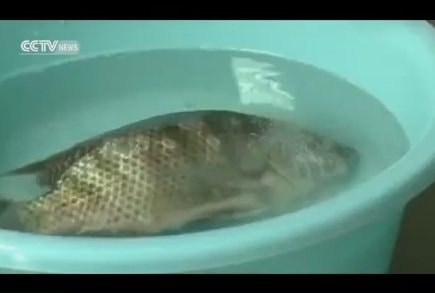Dying fish revived thanks to Chinese "strange powder"
The fish that was nearly dead came back to life after being given a little powder. It is believed that it was a Chinese chemical used to revive fish, causing great confusion among the people.
In recent days, netizens have been sharing a video about a drug said to be a Chinese chemical that can bring nearly dead fish back to life.
The video shows two stiff tilapia and red tilapia fish about to die, and people put some white powder into it. Immediately after, the fish seemed to come back to life and start kicking vigorously.
The video has been shared rapidly on Facebook, causing panic among consumers. People believe that this is a form of commercial fraud, a barbaric practice of the seller, which can cause poisoning to the consumer.
| ||
| Dying fish suddenly come back to life thanks to "strange powder" |
According to chemical experts, there is currently no chemical that can bring animals back to life.
Doubting about the above powder, Associate Professor Tran Hong Con - Lecturer of Chemistry Department, Hanoi University of Science said that if the image in the clip is correct, the above powder could be sodium peroxide powder, an inorganic compound with the formula Na2O3.
It is a product of the combustion of sodium with oxygen. It is a strong base and oxidizing agent. It exists in several hydrate and peroxyhydrate forms.
Sodium peroxide is used to bleach wood pulp in the papermaking and printing industries. More recently it has been used mainly in specialized laboratory operations, such as the separation of metals from ores.
In the video, the fish is dying due to lack of oxygen. When this powder is dropped into the water, Na2O3 dissolves in the water to create a large amount of oxygen. Oxygen enters the fish's gills, causing the fish to react by thrashing vigorously, but the fish cannot live long, and can die in just a moment.
Associate Professor Dang Hong Con further explained that the first phenomenon of the fish struggling was due to the addition of oxygen, which excited the fish. Second, the water suddenly had a spike in alkalinity, which stimulated the fish's open tissues such as its gills... causing it to react.
But surely after just a few minutes the fish will die due to the high alkalinity of the water.
In terms of food safety, Associate Professor Con emphasized that if this substance is used to increase oxygen concentration, there is no problem. However, if industrial chemicals are used in food production, it needs to be reconsidered.
Na2O3 according to its chemical properties after releasing oxygen in water, it will exist as a strong alkaline substance - NaOH can corrode the skin of hands and body organs when in contact with it. Therefore, this chemical is dangerous but not highly toxic.
Highly alkaline foods are very easy to decompose and decompose faster than normal, even if the alkaline concentration is high, ammonia will be released from the proteins in the food causing an unpleasant odor.
So the possibility of us ingesting very little amount of fish alkali in their bodies is small, it is not toxic to users.
According to Dan Viet


